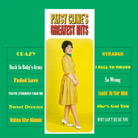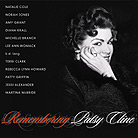November 2003
Cline combined absolute emotional honesty with technical polish. She arrived at her complete command of her voice through hard work; she began singing at age 13 on a local radio station in her hometown. By the time of her first recording session in 1954, she was 22 and a seasoned veteran. She was able to express complex emotions because she had lived them. She helped support her family from age 15, when her father left the family, and she married at age 20. With the help of a sympathetic producer, Owen Bradley, she learned precisely how to use her gifts. I won’t make the argument that Cline was the same kind of singer as Aretha Franklin, but her voice had the same force, the same sense of tremendous power held it in reserve for the right moment, that Franklin’s Atlantic-era records had. MCA Nashville released two discs to commemorate Cline’s 71st birthday, a remaster of her greatest-hits collection and Remembering Patsy Cline, a tribute disc of those same songs interpreted by 12 current female singers. Nearly everyone has heard at least a couple of tracks from Patsy Cline’s Greatest Hits, which has sold 10 million copies worldwide since its 1967 release. Bob Ludwig remastered the set, and it’s been issued in its original cover art. The remaster is a powerful illustration of how much digital technology has improved. The glassiness of the 1988 CD has been replaced by an analogue-like smoothness, and subtle details -- brush strokes on the drums, the texture of the guitar tones -- are more sharply focused. I hope Ludwig soon remasters other Patsy Cline titles. Remembering Patsy Cline includes contributions from country, pop, and jazz singers and, therefore, it’s even more fragmented in character than most tribute discs. Natalie Cole’s version of "I Fall to Pieces" is perfectly fine and I’d enjoy hearing it on one of her own discs, but it underscores how good the song is rather than telling us anything about Patsy Cline’s influence on Cole. The overblown arrangement on Terri Clark’s "Walking After Midnight" demonstrates how much better Cline’s producer, Owen Bradley, understood the importance of space and a well-placed guitar or piano line. The best moments belong to Patty Griffin, whose combination of beauty, power, and restraint on "Faded Love" recalls Cline’s, and Jessi Alexander, who does the vocal catches on "So Wrong" just right. Diana Krall’s version of "Crazy" is underpowered, but Norah Jones’s "Why Can’t He Be You" sneaks up on you subtly, in much the way her popular CD does. Michelle Branch surprises with "Strange" (a little too girlish, perhaps), while k.d. lang disappoints by choosing to sing "Leavin’ on Your Mind" in her current sophisticated pop style rather than in the Cline-influenced manner of her early recordings. I have no idea what point Rebecca Lynn Howard or Martina McBride (accompanied by Take 6) were trying to make with their tracks, but Amy Grant’s "Back in Baby’s Arms" is done in a terrific Western swing style. Grant seems a little lightweight at first, but by the end of the song she had me convinced. Still, as much as I enjoyed a number of tracks on Remembering Patsy Cline, at $18.98 list you’d be better advised to plunk down $11.98 for the new Patsy Cline’s Greatest Hits and enjoy the genuine article in perhaps the best sound ever. GO BACK TO: |
 Patsy Cline - Patsy
Cline's Greatest Hits
Patsy Cline - Patsy
Cline's Greatest Hits Various - Remembering Patsy Cline
Various - Remembering Patsy Cline "Patsy taught
me emotion," Reba McEntire says of Patsy Cline. "I sure wish I could have known
her." Cline was the kind of singer who seemed to leave no emotional distance between
her and the listener -- we feel as if we really did know her. The details of her life,
made widely known through the film Sweet Dreams, reinforced for many the sense that
she lived the songs she sang. Her big voice could be alternately brassy and caressing, as
country as a cornfield or as uptown as a Cadillac.
"Patsy taught
me emotion," Reba McEntire says of Patsy Cline. "I sure wish I could have known
her." Cline was the kind of singer who seemed to leave no emotional distance between
her and the listener -- we feel as if we really did know her. The details of her life,
made widely known through the film Sweet Dreams, reinforced for many the sense that
she lived the songs she sang. Her big voice could be alternately brassy and caressing, as
country as a cornfield or as uptown as a Cadillac.